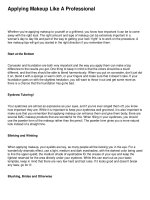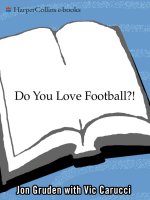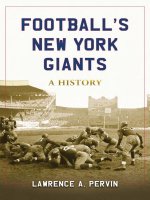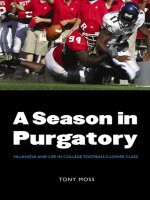IF FOOTBALL’S A RELIGION, WHY DON’T WE HAVE A PRAYER? pptx
Bạn đang xem bản rút gọn của tài liệu. Xem và tải ngay bản đầy đủ của tài liệu tại đây (855.45 KB, 257 trang )
Winning with Heart, Passion,
and Not Much Sleep
Do You Love
Football?!
Jon Gruden
with
Vic Carucci
To Mom, for helping me find my passion. To Dad, for showing
me the way. To Cindy, for making tremendous sacrifices as a
wife and mother that allow me to do this job. To Deuce,
Michael, and Jayson, for constantly reminding me of what is
truly important in life. To Jay and Jim, for providing all of the
inspiration and support that a brother could ever want. To all
of the coaches and players it has been my great privilege to
work with and compete against, and to all of those coaches and
players out there I haven’t met yet. I know you love football!
—J.G.
To Rhonda, Kristen, and Lindsay. I know this is another dedi-
cation, for another book, but you are a one-of-a-kind family. I
can’t tell you enough how much I love you and how blessed I
am to have you in my life.
—V.C.
CONTENTS
ONE
“Do You Love Football?” 1
TWO
Doing It the Knight Way 15
THREE
Notre Dame, Dan Devine,
and the Best and Worst of Witnessing
Greatness from the Inside
25
FOUR
If You Can’t Throw the Perfect Pass,
Draw the Perfect Circle
39
FIVE
Whether You’re Cutting Film or
Cutting a Rug, You Can’t Volunteer
55
Too Much for Knowledge
iv
CONTENTS
SIX
Finding Harvard in San Francisco 81
SEVEN
When Opportunity Calls,
You Answer on the First Ring
107
EIGHT
“Boy Wonder or Boy Blunder?” 137
NINE
If the Head Coaching Jacket Fits, Wear It 165
TEN
Who’s Chucky? 177
ELEVEN
Changing Teams Doesn’t Mean
Changing Expectations
197
TWELVE
Validation 217
Acknowledgments 245
Praise
Credits
Cover
Copyright
About the Publisher
About the Authors
ONE
“Do You Love Football?”
Well, do you? You love football? You do, don’t you?
You love it! You know you love it!
—D
AVE ADOLPH,–
linebackers coach, Oakland Raiders
Image unavailable for
electronic edition
Loving every minute of the game-day experience.
(Tom Wagner/Tampa Bay Buccaneers)
day. I don’t think I can ever recall a time when football—in one
form or another—didn’t have a major influence on everything I
thought, everything I said, everything I did.
High school. College. Pro. Our family was moving around
with each coaching job my dad held at all three levels. Or I was
playing quarterback in high school. Or I was hoping to see the
field as a college quarterback. Or I was changing coaching jobs
myself in a never-ending quest for knowledge and improvement.
Football really is all I know. Other than going to the beach
once in a while and watching the waves, it’s really the only
interest I have outside of my wife and our three boys. I’m not a
scratch golfer. I don’t know how to bowl. I can’t read the stock
market. Hell, I have a hard time remembering my wife’s cell
phone number. But I can call, “Flip Right Double X Jet 36
Counter Naked Waggle at 7 X Quarter” in my sleep.
I love the competition of the game. I love the players who
play it. I love the strategy, the variables. I love the smell of the
grass, the sound of the stadium. I love the thrill of victory. I like
to see how we respond to the adversity that a loss brings and to
the sudden changes that we have to deal with, whether it’s a
fumble, an interception, a fifteen-yard penalty, or something
worse, like our right tackle suffering a broken ankle. What’s the
weather going to be like? What kind of crowd will we have?
Football is the ultimate team game. There are just so many
people who play a role. There are trainers, managers, coaches,
4
JON GRUDEN
players, fans, media. It’s just so exciting. I consider myself for-
tunate to have been able to see it at such close range for so long.
The game day experience is what really gets me juiced. I’m
up at 3:17
A.M. most days, and that includes the morning of a
game. Home or away, we stay at a hotel the night before, and
I’m always waiting for the newspaper guy to make his delivery
to my room at five-thirty. At breakfast I’m waiting for the eggs
to come out, even though I don’t eat very much. If we’re on the
road I’m waiting for the first bus to the stadium to arrive at the
hotel (for home games I usually catch a ride with Bill Muir, our
offensive coordinator and line coach).
Once I’m at the stadium I sit at my locker and for the next
three, four or five hours before kickoff I go over my sideline
sheet, which contains the offensive game plan, minus the dia
-
grams. We probably carry about 125 passes and maybe 30 runs
into each game, but the typeface on the sideline sheet has been
reduced small enough so that they all fit on both sides of an
eight-and-a-half-by-eighteen-inch piece of paper that I laminate
and can refer to while I’m calling the plays from the sideline.
I have columns for different situations—first-and-ten, first-and-
fifteen, second-and-one-to-five, second-and-six-to-nine, second-
and-ten-plus, third-and-short (one to three yards), third-and-
medium (four to six yards), third-and-long (seven to ten yards),
third-and-extra (beyond ten yards)—and the calls I can make in
each of them. I have columns for different spots on the field,
such as the “red zone,” which I break down into plus-five, plus
-
ten, plus-fifteen and plus-twenty, with five or ten runs and
passes in each. I have columns for goal line, short yardage, play
passes, nickel passes, nickel runs, nickel blitzes, Cover Nine (our
term for two-deep zone). I might even have a Keyshawn John
-
son column, and at some point I’ll look down at it and say, “I’ve
got to get him involved. I’ve got to get him going.” Okay, okay,
I’ve got to get him the damn ball.
I prioritize the calls that I’ve gone over with the staff and the
5
DO YOU LOVE FOOTBALL?!
quarterbacks the night before the game, but when I get to the
stadium I say to myself, Okay, what if I use number one? What
if I use number two? Do I really like number three? What if
they start playing a lot of Cover Nine? Do I have enough Cover
Nine throws in the game plan? I’ll make notes to myself on the
sideline sheet, which also has the first names and numbers of
each of the officials (just in case I have any reason to have a nice
chat with them during the game) and the names of three of the
most important people in my life—my sons, Deuce, Michael
and Jayson. I’m usually feeling pretty guilty late in the week
when I’m at the office working on the game plan instead of
being home with those guys and my wife, Cindy. Seeing their
names helps me to maintain a little sense of balance when I need
it the most, such as in the middle of a game when the running
battle between your head and your heart can easily tilt you too
much in one direction or another.
I take different colored Sharpie fine-point pens—red, blue,
green and black—and use certain colors to highlight sections of
the sideline sheet and to write notes. Using these colors is the
only thing I’m superstitious about. I’ll say, “Ah, the green pen’s
in a slump; I’m getting it out of here. I’m using black and red
this week.” If we kick somebody’s ass, if we play a really good
game, I’ll say, “I’m going to stay with red for the next couple of
games. Red’s hot.” It’s silly, I know, but you don’t want to mess
with the mojo.
The sideline sheet is everything to me. We have our first fif-
teen plays scripted—as most teams have been doing ever since
Bill Walsh, the godfather of offensive football, had so much suc
-
cess doing it—because you always want to have that beginning
point for your offense. You need that preview of exactly how
you intend to attack your opponent, but I also love to think
about situations that are going to come up along the way. I just
know Derrick Brooks is going to scoop a fumble or he’s going
to intercept a pass or he’s going to do both. We are going to
6
JON GRUDEN
generate turnovers, and when we get a sudden change in our
favor, the crowd’s going crazy, the offense is running out there
and we’re first-and-ten at midfield. What do you call? When
Brian Kelly intercepts a pass and runs it down to the two-yard
line, what do you call? Do you go right to your goal-line col
-
umn or do you go to your plus-five passes?
The sideline sheet represents a week of hard work. I like
knowing that we have a heck of a plan, that we’ve worked it all
week and that on top of that we have contingency plans that are
well thought out before the game so that we don’t have to make
eighteen different adjustments at halftime. We have Plan C if
Plan B goes awry. If Plan C doesn’t work, Plan D isn’t a bad
way to go, either. And if Plan E is necessary, by God, I’ve got
that, too. The sideline sheet is my crutch, my all-in-one tool, my
security blanket.
After I’m done reviewing the sideline sheet, I greet the players as
they come in the locker room. Quite often I will ask guys the
same question that I pose practically every day of the week:
“Do you love football?”
By week ten, week eleven, these guys start to get the long
eyes and it becomes tough to get them up for practice on
Wednesday and Thursday. So when I spot one of them in the
hall, instead of just saying hello or nodding my head, I’ll get
kind of a crazy look on my face and ask, “Do you like football?
Do you? Do you love football? Do you love it? You do, don’t
you? You love football, don’t you? I know you love football.”
It’s my way of reminding them that the only reason you’re
playing football or coaching football is because you have a love
for it, and that passion is a powerful force that can carry you
through any obstacle that gets in your way. Don’t get totally
bent out of shape with what the writers are saying or what the
pressures of the game bring. We’re playing and coaching because
we love the game, man. How the hell else can you explain put
-
7
DO YOU LOVE FOOTBALL?!
ting on shoulder pads and cranking into a Crowther blocking
sled or diving for a catch and landing on the ground twice a day
during the hottest month of the year in training camp? How the
hell else do you work like we work as players and coaches unless
you love it?
The origin of my “Do you love football?” question goes back
to 1998, after the very first game of my very first season as a
head coach. My debut with the Oakland Raiders, on Sunday
Night Football, was ugly. U-G-L-Y. Kansas City kicked our asses
28–8 in Arrowhead. Sacked us ten times. Made for one of the
longest and most humiliating nights of my life. We flew back to
Oakland that night, landing at about four in the morning. I slept
on the floor of our facility, as did the rest of the coaches. I woke
up a few hours later and got a cup of coffee. As I sat in my office,
feeling like a total moron at 0–1, Dave Adolph, our linebackers
coach, walked in. It was pretty obvious I was in need of some
sort of morale boost. I think Dave, who was about sixty years
old at the time and had seen a whole lot more football than I
had, was checking to make sure that I wasn’t packing my stuff
and getting ready to head out the door for good.
“You like football?” he said in a loud, raspy voice, knowing
full well that at that point I was hating football, myself and the
day I signed that first contract to become a head coach. I looked
at Dave and smiled, probably for the first time since we had
boarded our flight to Kansas City two days earlier.
“Well, do you?” Dave asked again. “You love football? You
do, don’t you? You love it! You know you love it!”
I nodded. Dave was absolutely right. I loved the game enough
to understand that as horrible as I felt, I was ready to come back
for more, ready to put it all on the line the following week
against our next opponent. As ugly as that game had been, I was
going to experience others that were just as ugly, if not uglier.
But I will keep coming back for more—every day, every practice,
every game, every season—until I don’t have a team to coach.
8
JON GRUDEN
Another favorite part of my pregame routine is going out to
see the stadium, just to get a feel for the environment we’re
going to play in. I walk around the field, check out the stands.
I’m just taking it all in with my eyes, my ears, my nose. Little by
little, step by step, I get myself worked up into the excitement of
game day.
There’s nothing like going into a locker room after a big win,
or walking off the field after winning on the road—after taking
one from their fans and their friends and their families—and
then getting on a plane and enjoying a three-hour flight home.
All of a sudden you don’t mind feeling sore and tired. There’s
validation, there’s justification, there’s worth. The investment
paid off. Winning and enjoying it with others are the two great
-
est feelings in this business. You work your butt off all year,
around the clock, to try to find a way to beat this team on this
day, regardless of what time the game is or where it is.
To help a player succeed is different from being the player on
the field having the success, but it’s certainly just as satisfying. I
know because I’ve been on both ends of it. I know how hard it
is to play this game because I wasn’t a very good player myself.
Probably the most disappointing thing in my life is that I never
amounted to anything but a ham-and-eggs backup quarterback
for a Division III college. But there’s tremendous satisfaction
from being involved in determining the structure of practice, in
putting together the game plan, in picking the right plays to call
and, finally, in the outcome of it all. I look at my role as a coach
the same way I look at being a teacher, like my mother was,
helping a student to get an A. The student got the A, but he
needed the teacher’s help to get it.
Sometimes losing teaches you a lot more about yourself and
your team than you ever learn from winning. It’s easy to be a
winner. It’s easy to react positively when things go well. Nor
-
mally, when you lose it’s because “You didn’t throw the ball to
this guy enough . . . This guy wasn’t involved enough . . . We had
9
DO YOU LOVE FOOTBALL?!
too many injuries.” In other words, there are just too many
excuses, too many ways to shift blame. Which is natural,
because after all we’re human and there are emotions in this
business that you have to deal with. But that’s when you’ve got
to rely on leaders. You’ve got to rely on the head coach, assistant
coaches and key players to help you through that time. It isn’t
easy. Believe me, it isn’t easy.
But you will battle through it. Sometimes you’ll start the
year off with a heartbreaking overtime loss—and five months
later have it end in the Super Bowl. That’s how it went for the
Tampa Bay Buccaneers last season, my first as their head coach.
There I was on September 8, 2002, in Raymond James Stadium
watching a botched punt in OT become an intercepted pass in
our end zone to hand the New Orleans Saints a 26–20 victory
in my official debut with the Buccaneers. And there I was on
January 26, 2003, standing on a platform in the middle of
Qualcomm Stadium in San Diego, celebrating our 48–21 vic
-
tory over the Raiders in Super Bowl XXXVII.
It’s hard to believe that such a range of emotions can be sep-
arated by such a relatively short amount of time. But, you
know, it’s also hard to believe a lot of the things that happened
to me in the course of the year and in the course of my career.
One minute someone’s calling you in the middle of the night
telling you that you’ve been traded—yes, traded—from Oak
-
land to Tampa Bay. The next minute you’re trying to sell your-
self and your ideas to players and coaches whose love and
loyalties still belong to the man you’re replacing. The next
minute you’re in the Super Bowl . . . staring across the field at
guys you coached and coached with for four years.
As exciting as it was to be up on that platform, I will never
forget the feeling of being on the sideline before kickoff. Right
behind me were Paul Warfield, Larry Csonka, Don Shula, Bob
Griese, Nick Buoniconti, Larry Little, and Jim Langer. These
Hall-of-Famers from the 1972 Miami Dolphins, the only unde
-
10
JON GRUDEN
feated team in NFL history, were there to participate in the
pregame coin toss. These are men who became immortal when
they beat the Washington Redskins in Super Bowl VII and fin
-
ished that season 17–0. And when they saw me, they said, “Hey,
Coach Gruden, good luck to you.” All I could think was Holy
Toledo! They know who I am. A little ham-and-egger from the
University of Dayton is talking to Don Shula and Paul Warfield
and Larry Csonka.
Right there it began to hit me how far I had come on this
wild and wildly fast journey. At thirty-nine I knew I still had
plenty of miles to go. I knew that there was still a whole lot
more for me to learn and accomplish. To that point, though, I
realized how much I had benefited from being around brilliant
front-office people and some exceptional coaches. I’ve always
considered the experience the football version of an Ivy League
education, like graduating from Harvard, only with pigskin
instead of sheepskin. And no one could have had a better live-in
professor than my own dad, Jim Gruden, who has helped and
encouraged me every step of the way.
As the Dolphin Hall-of-Famers walked out for the coin toss
I got on the headset to my younger brother, Jay, who worked as
an offensive assistant on our coaching staff during the season,
and said, “You should see Larry Csonka, man. I’ll bet he was a
bitch to tackle.” Jay laughed. Pretty goofy stuff to be talking
about only minutes before the biggest game of our lives, don’t
you think? But that’s what football is all about—plugging into
the energy and excitement of the moment, reflecting on the
memorable games and plays of the past, pondering the many
challenges ahead. There really is nothing like it.
You can always find something to complain about in life.
I’ve never liked being around a guy who has a litany of excuses,
a guy who bitches all the time. In other words, the kind of guy I
was on the way to becoming earlier in my career. It took my dad
to set me straight. We always talk by phone four or five times a
11
DO YOU LOVE FOOTBALL?!
week. After getting off to a 1–3 start in my first year as offensive
coordinator of the Philadelphia Eagles, I was bitching to my dad
about everything.
“Man, we’re just terrible,” I said. “We can’t do anything
right. We’re going to get our asses kicked.”
I was looking for a little sympathy, maybe a little under-
standing from someone who would know exactly where I was
coming from and, as a bonus, might just hate to hear one of his
boys sounding so unhappy. Did I ever have the wrong person
for that.
“Hey, if you don’t like it, why don’t you leave?” my dad said.
“If you don’t like it, then get the hell out of town. Do something
else, because this is coaching football.
“You’ve got a great opportunity, son. You’re the offensive
coordinator of the Philadelphia Eagles. Do it! Coordinate the
offense!”
I got off the phone and realized that he was absolutely right.
You can go through this business complaining about everything.
Even though we wound up winning the Super Bowl, there were
a lot of reasons for me to bitch and make excuses during last
season: Oh, man, I have to put together a new coaching staff
because all the assistants I had in Oakland were under contract.
Damn, we’ve lost Marcus Jones, one of our defensive ends, for
the whole year with a knee injury. Geez, we haven’t had
Anthony McFarland, one of our starting defensive tackles, for
almost half of the regular season because of his broken forearm
and broken foot, and now we won’t have him for the playoffs.
Golly, Brad Johnson, our starting quarterback, is going to miss
the last two games of the season with an injured back.
I don’t want to be like that. I don’t want anybody around me
to be like that. We’re here for a very short time, and we’re in the
NFL. Are you kidding me? What an ideal setting to have some
fun. If you don’t have fun coaching or playing in the NFL,
where are you going to have fun in America? You travel on a
12
JON GRUDEN
beautiful jet airplane. You stay in a Ritz-Carlton. You eat the
nicest food you could ever think of eating. You have a police
escort to the stadium. You have brand-new footballs. You have
socks that fit and stay up perfectly. You have a stadium packed
with fans.
It’s exciting as hell.
Now, it’s not easy. There are all kinds of challenges to face,
all kinds of reasons to whine. But nobody wants to be around a
whiner. Nobody wants to hear your excuses. Does that mean I’m
always fun to be around? Get real. To be honest, there are a lot
of times when I can be a miserable sonofabitch. I’ve been
accused of being a guy who sometimes has to be miserable to be
happy. I don’t know why that is. What I do know is that I don’t
ever want to get the feeling that everything’s perfect, everything’s
rosy because that’s when you lose your edge. If you let that hap
-
pen to you, you’re dead.
Peek into my brain and you’ll see what I mean. On any given
day, I’ll be thinking things like:
You won a big game, so what? We’ve got to play these guys
now. They’re bigger and stronger than the team we saw last
week.
How come our third-round draft pick from last year is not
performing up to the standards that we expected him to?
Hey, what’s the deal with this weight machine? How come
the Denver Broncos have a bigger one than ours?
Oh, you won the Super Bowl. That’s great. But we haven’t
won a game this year, have we? What are we going to do this
year?
I’m still in search of what I call the Master Game Plan, the
head coach/offensive coordinator’s Holy Grail. That’s the one
where your opening possession’s a nine-play, eighty-yard touch
-
down drive. You never punt. You never turn the ball over. You
never commit a penalty. You score touchdowns on every series.
You score seventy, eighty points in a game. That’s what we’re
13
DO YOU LOVE FOOTBALL?!
after. It can be done. It will be done in the NFL. If I can’t aim
high, aim for the absolute best, aim for what some people might
think is impossible, well, if I can’t do that, what’s the use?
I also know this: Through the highest of highs and the low-
est of lows, you’re always going to be ahead of the game if you
love what you do for a living. It’s like Kathy Gruden taught her
three sons while we were growing up: “The most important
thing is to find your passion and go after it.”
For me and for Jay, it’s football. Hell, Jay’s thirty-six years
old and he’s still playing quarterback for the Orlando Predators
of the Arena Football League. For my older brother, Jim, it’s an
entirely different calling; he’s a successful radiologist. You can
bet that Jim is every bit as passionate about that as his two
brothers and our father are about football, and as our mother
was throughout her teaching career.
You only live once, so you might as well find something that
you love to do and do it. Get after it. Max out.
Doing It
the Knight Way
“We are not going to tolerate error!”
—C
OACH BOBBY KNIGHT–
Image unavailable for
electronic edition
A young football dreamer.
(Courtesy of the author)
and my desire to pursue a career in coaching. He’s still involved,
as a consultant to our player personnel department, which he
joined in the summer following his retirement after sixteen sea
-
sons as a regional scout for the San Francisco 49ers.
How about that? I’ve got my dad providing his scouting
expertise. I’ve got my brother Jay helping me call plays from the
press box. All I have to do now is hire Jim as one of our team
doctors and we’ll have the Gruden family pretty well covered.
Before I was even born my dad was assistant football coach
at Fremont Ross High School, located about twenty miles out
-
side of Sandusky, Ohio. That was where I joined the Gruden
roster, but it wouldn’t be long before football would cause my
dad to make a series of moves throughout the state—to Craw
-
ford, where he was head coach at Galion High; to Tiffin, for an
assistant coaching position at his alma mater, Heidelberg Col
-
lege, where he had also played quarterback; to another assis-
tant’s job at the University of Dayton, where John McVay was
the head coach at the time before going on to coach the New
York Giants and become general manager of the 49ers.
Wayne Fontes, former coach of the Detroit Lions, and his
brother, Lenny, who was an NFL assistant, were also on that
Dayton staff. Lenny had a son by the same name. Whenever the
Flyers played at old Baujan Field, young Lenny and I would pick
up about nine or ten of those red paper Coke cups off the
ground, crumple them up and jam them together until we
18
JON GRUDEN
formed the shape of a football so we could play our own little
game of tackle in the end zone as the actual game was going on.
That is, until someone would run us out of there.
In 1973 my dad made his first big jump when he became
running backs coach for Lee Corso at Indiana University. I was
ten years old when he took the job, and I remember every one
of those players. While my dad and I were sitting in field-level
seats at one of my brother’s arena football games, my dad sud
-
denly pointed to the guy holding the down-and-distance marker
on the sidelines.
“That’s Dale Keneipp,” he said.
“Number thirty-seven?” I said.
My dad almost fell out of his chair because I had remem-
bered Dale’s number and the fact he had played safety for Indi-
ana in 1973.
Not long after that I got a call from my dad, who told me
that Walter Booth, a cornerback on that ’73 Indiana team who
went on to become a lawyer, wanted to talk to me about invest
-
ing some of my money.
“Number six?” I said.
I can remember Trent Smock and Keith Calvin at receiver,
Scott Arnett at quarterback, Mike Harkrader at tailback,
Courtney Snyder at halfback and Rick Enis at fullback. I can
name the whole team, even though the way it performed on the
field could make a lot of those guys easy to forget. Our best sea
-
son was 5–6. We got our brains beat in by the Big Ten power-
houses like Ohio State and Michigan.
While living in Bloomington, Indiana, I became friends with
Tim Knight, a fellow member of the Working Men’s 49ers Pop
Warner football team. He was just like me, the son of a coach.
The only difference was his father was Bobby Knight. I don’t
give a damn what sport we’re talking about, he sets the stan
-
dard for coaches everywhere. Coach Knight would take the IU
basketball team all over Indiana, to places like New Castle and
19
DO YOU LOVE FOOTBALL?!
Fort Wayne, just to play scrimmages. There is no way to over-
state Indiana’s obsession with basketball. The movie Hoosiers
has it exactly right. Sometimes Tim would call up and invite me
to come along as one of the ball boys with him, and that made
me one of the luckiest kids in the world. I’d be riding on a bus,
throughout the state of Indiana, with the IU basketball team. I’ll
never forget it. Tim and I would sit in the back, eating grape
candy with Quinn Buckner, Bobby Wilkerson, Wayne Radford
and Kent Benson.
Once we went into the locker room at halftime, and Knight
wasn’t only coaching his starters; he was coaching the whole
team. I stood there quietly and was just blown away. I remem
-
ber him talking about defense. Well, not talking—screaming.
Yelling about playing defense and hustling. Giving a thorough
demonstration of the difference between a stationary and a
moving pick. I also remember that his players gave him their full
attention when he walked in that room—and tremendous
respect. It was clear to me then that Coach Knight is a true
leader and puts his whole being into what he does.
There was a lot of conformity there, which was something
my dad understood better than I did at the time. He told me
that I had to have my hair cut before I got on the basketball
team’s bus. I was pissed about that because I thought I looked
kind of cool with the long, scraggily hair I had back then. But
the rules were the same for every kid with any connection to the
IU team: no earrings, no jewelry, no tattoos and, unfortunately,
hair above the ears. When we would stop at a restaurant for
dinner on the way home, everyone was reminded about table
manners and proper conduct. Assistant coaches were on top of
every detail. It was a class operation. It was about how to
become a man.
Coach Knight’s practices were like games. Actually, they
were harder than games. Honest to God, his practices were
longer than and as intense as anything I had ever seen. They









